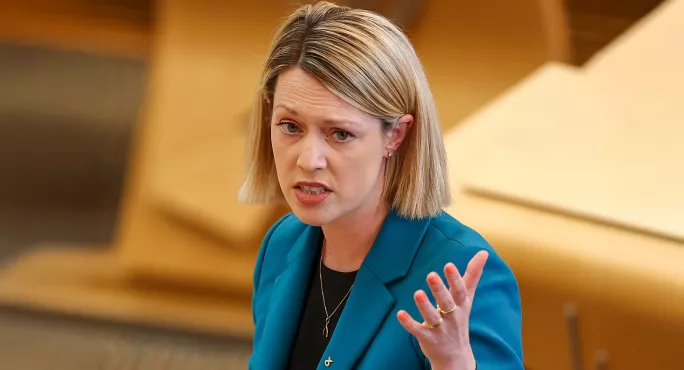Gilruth backs controversial SQA Higher history review

Education secretary Jenny Gilruth has said that she is “content” with the review of Higher history carried out by the Scottish Qualifications Authority (SQA) after a big drop in the pass rate this year.
She also said that the SQA - and its chief executive, Fiona Robertson - have her “full confidence”.
Today, Ms Gilruth and Ms Robertson faced a barrage of questions from the MSPs on the Scottish Parliament’s Education, Children and Young People Committee.
They faced repeated calls for an independent review to investigate the rise in students failing this year’s Higher history exam.
The review was prompted by concerns that the marking of Higher history this year had been harsher, resulting in an A-C pass rate of 65.7 per cent, down 13.1 percentage points from 2023.
‘Dismay’ of teachers and students
The Higher history review - which was delayed and finally published last month - found the marking standard was consistent and blamed the fall in the pass rate on a weaker performance by students.
This afternoon, the education committee convener and Conservative MSP Douglas Ross said the response of some teachers and pupils to the review had been “dismay”.
Other committee members repeated concerns that the report had been a “whitewash” and had further undermined confidence in the SQA. Labour education spokesperson Pam Duncan-Glancy said teachers and students had described it as “a gut punch” and “insulting”, and they felt that they had suffered “injustice” and been “completely let down”.
- Background: Higher history review finds marking standard did not change
- Related: Higher history - a view from the principal assessor and senior team leader
- News: SQA exam appeals - what happened in your sector and subject in 2024?
However, both Ms Gilruth and Ms Robertson stuck by the report.
Ms Gilruth was asked by Mr Ross if - given everything known about teachers’, students’ and markers’ concerns - she still had “full confidence in Fiona Robertson and the way she and the SQA have handled this”. Ms Gilruth responded that she did.
She said she was “content” with the report, which she described later in the meeting as “rigorous”.
As opposed to the marking standard changing, it was suggested that variability in pass rates was not out of the ordinary: Ms Gilruth said “notable drops in relation to the pass rate happen every year”, while Ms Robertson said “variability in attainment is not unusual”.
To illustrate the point, Ms Robertson said the A-C pass rate for Higher applications of maths had dropped by 13.3 per cent, while the pass rate for Higher religious, moral, and philosophical studies had risen by just over 7 per cent.
Explanations for the drop in the Higher history pass rate included worsening literacy standards among candidates, and students being put forward for the qualification without enough preparation. Ms Robertson said there was evidence of learners “struggling” with “extended pieces of writing” more than previously.
Ms Gilruth said “a key theme” in the report was “over presentation” and that students were “potentially sitting a qualification at a level they might not be ready for”, which could be impacting performance.
A quarter of students sitting Higher history had no other qualifications in the subject, Ms Robertson said.
Implications for reform process
Ms Gilruth, however, said the fallout could have implications for the ongoing reform process which - among other changes - will see the SQA replaced by a new body, Qualifications Scotland, in 2025.
Early in the reforms, in 2022, the government rejected a proposal from the Organisation for Economic Cooperation and Development - and also from Professor Ken Muir - to separate the SQA’s functions so that it no longer both awards and regulates qualifications.
Recently, there have been growing calls for a rethink.
Today, Ms Gilruth said: “I’m particularly mindful of the role of accreditation in this and how we can give that confidence to the system that there is an independence of thought in terms of applying that regulation to the qualifications.”
Ms Gilruth also suggested that qualifications reform could stop a repeat of the controversy around Higher history, by placing more emphasis on continuous assessment; this would help prepare students for qualifications and could help address over-presentation.
Asked why the SQA carried out the review - as opposed to an independent body - Ms Robertson said the answer was simple: it was the SQA’s job.
She also said: “There is a choice about where the regulator sits”.
She suggested that if current arrangements were not instilling public confidence in the qualifications system, it was “legitimate” to ask questions about potential change.
Pressed by Mr Ross on whether she would consider an independent review, Ms Robertson said she would be “happy” to consider it, but did not think it necessary.
She said: “I don’t think, on the basis of the report and the conclusions of the report, that further investigation is required.”
For the latest in Scottish education delivered directly to your inbox, sign up for Tes’ The Week in Scotland newsletter
Keep reading for just £1 per month
You've reached your limit of free articles this month. Subscribe for £1 per month for three months and get:
- Unlimited access to all Tes magazine content
- Exclusive subscriber-only stories
- Award-winning email newsletters
topics in this article



